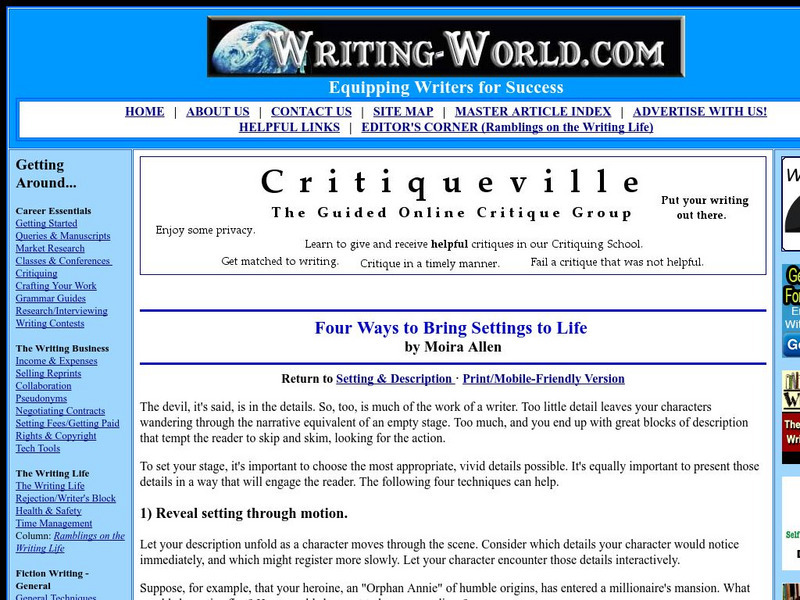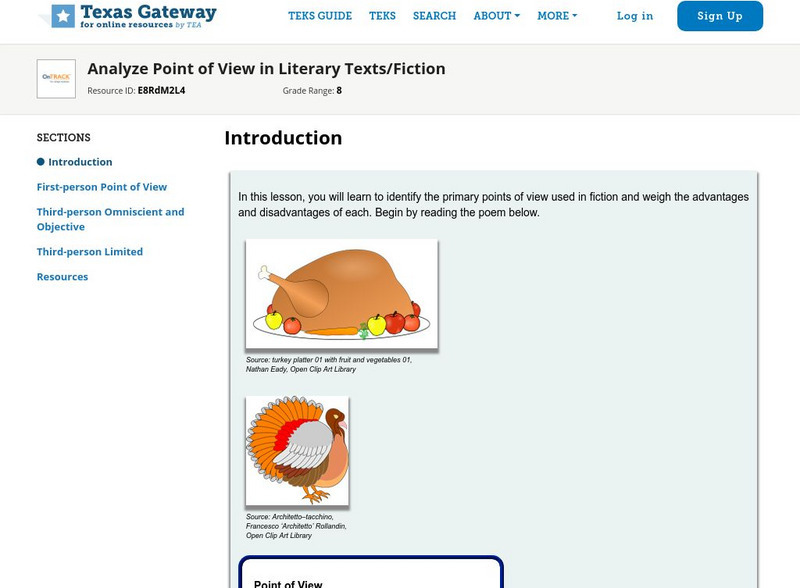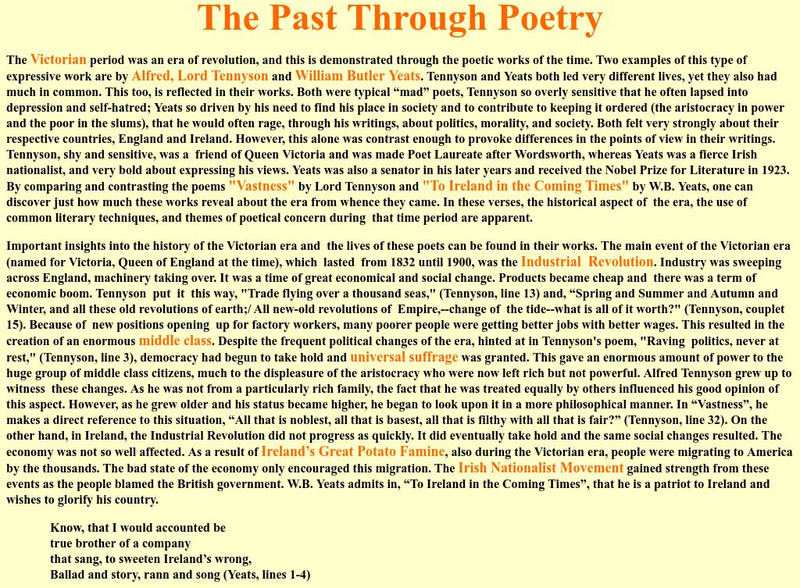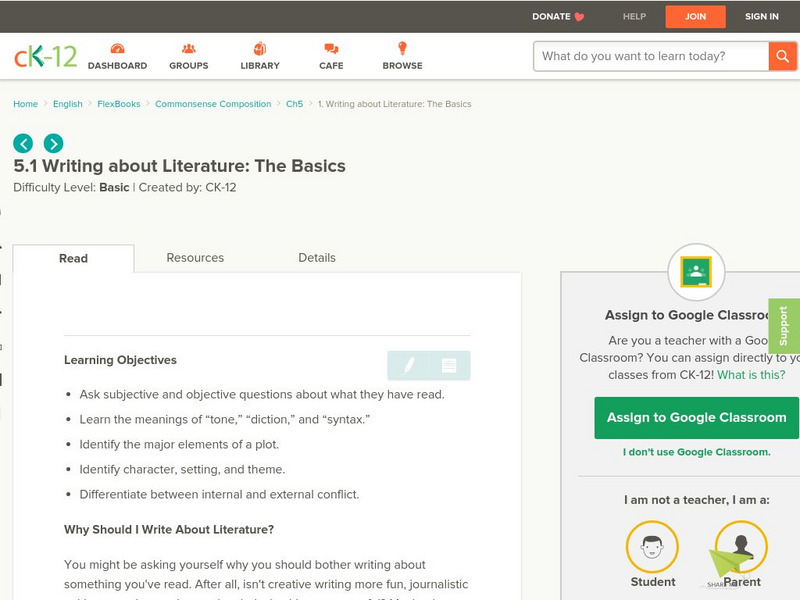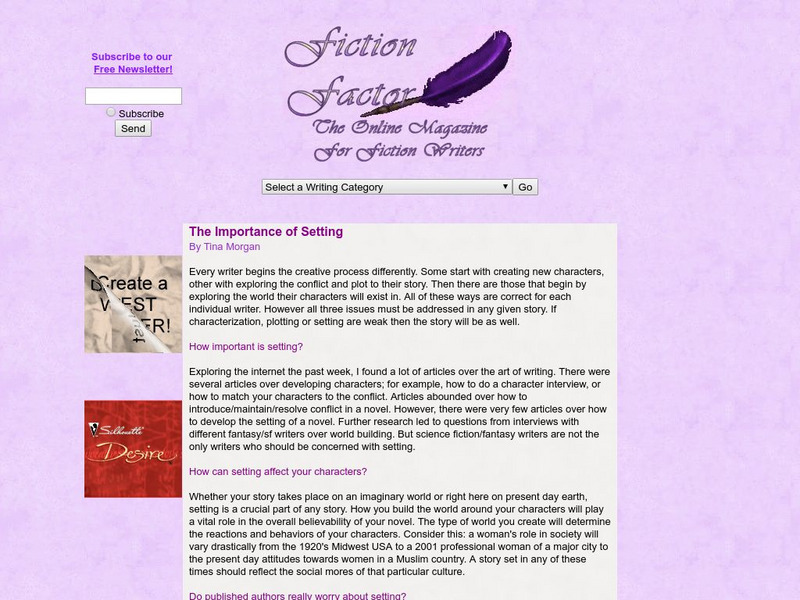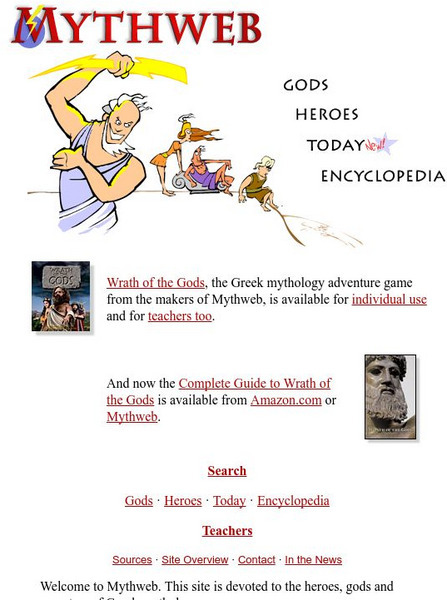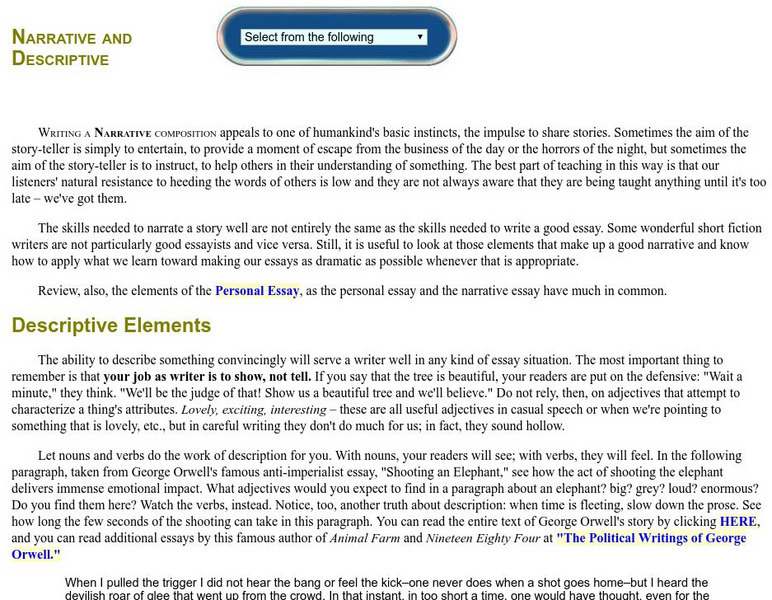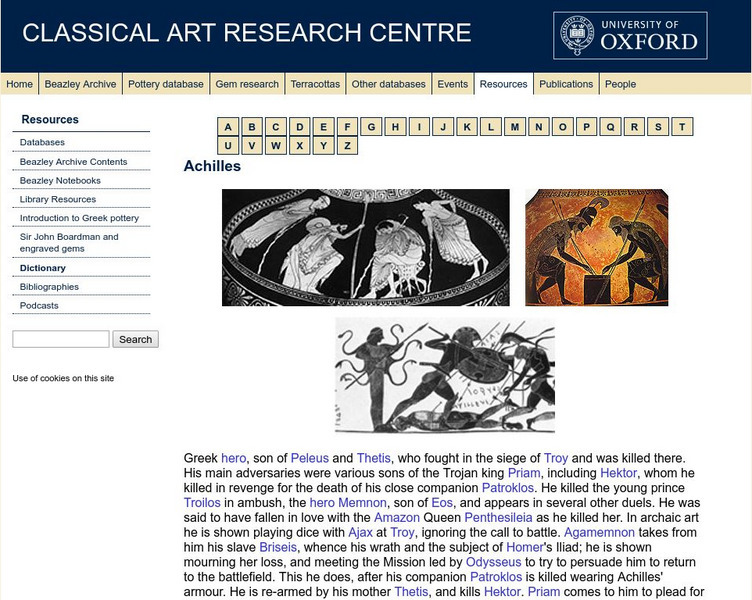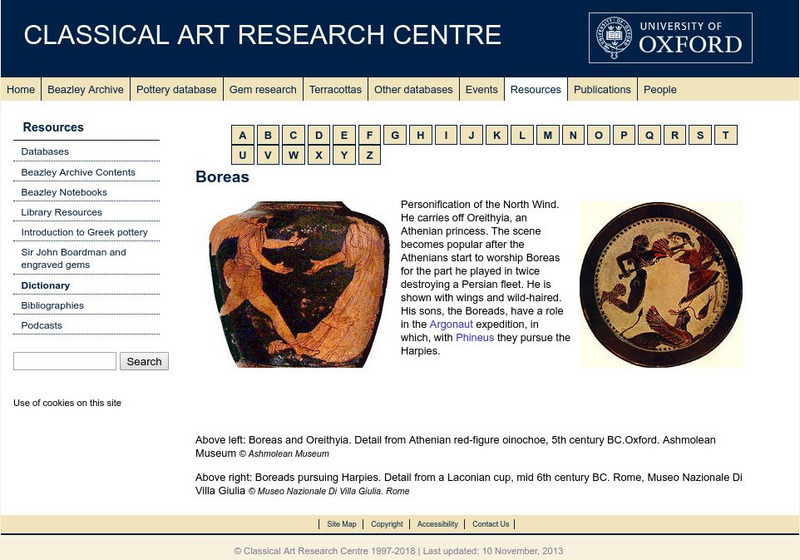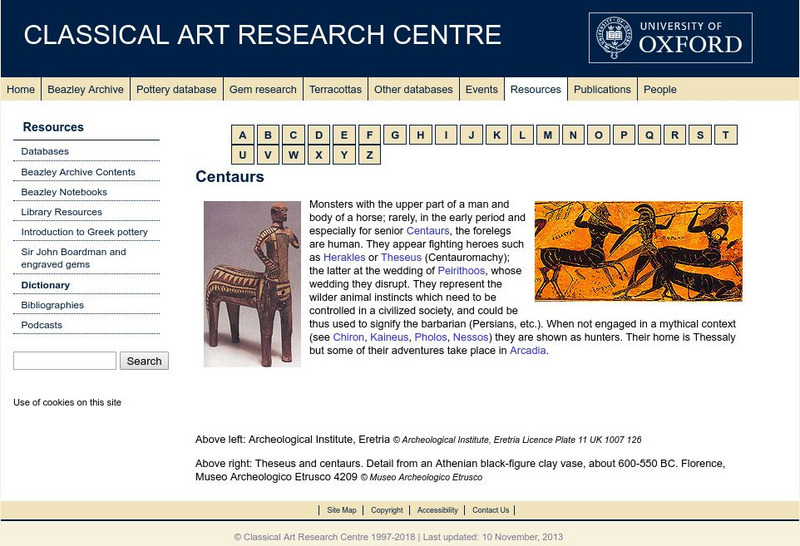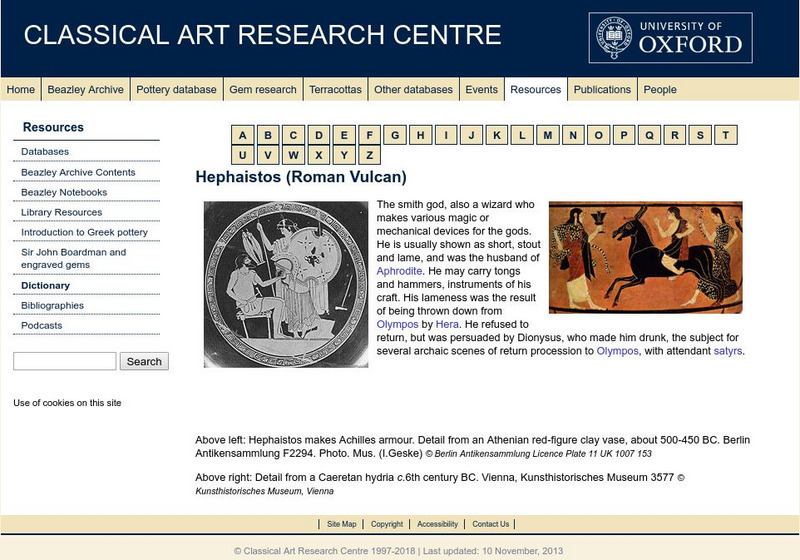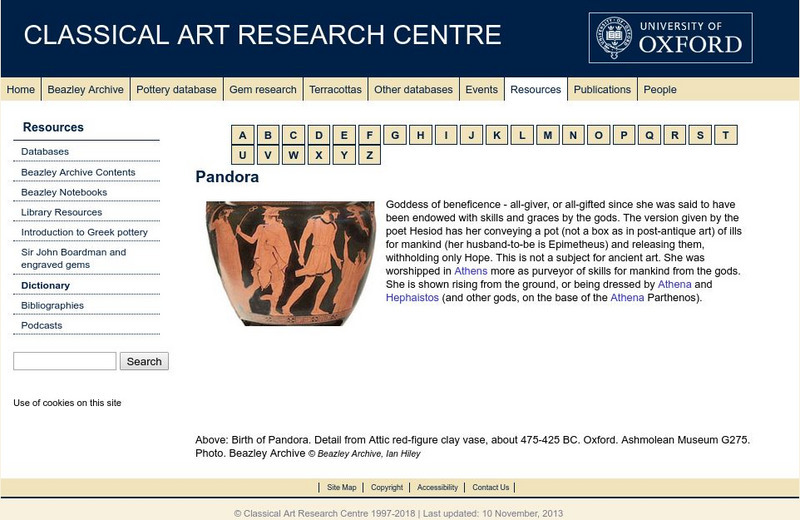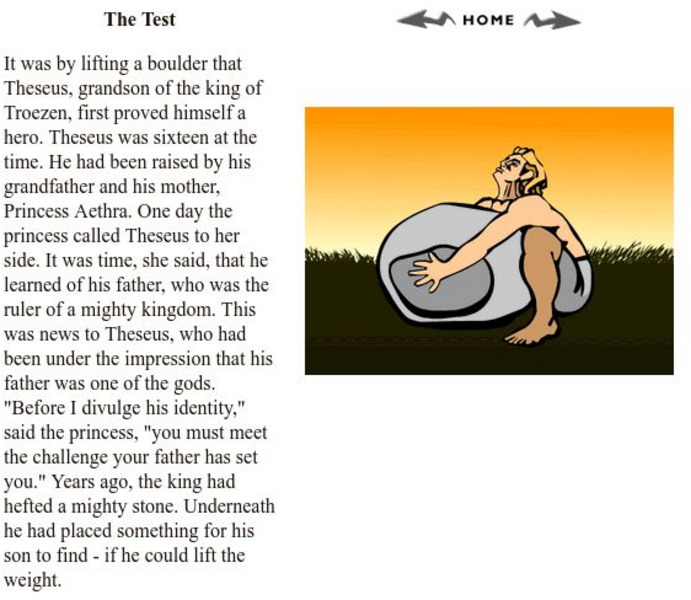Other
Writing World: Four Ways to Bring Settings to Life
A great resource outlining four major ways to make settings appear more real and genuine in fiction. Deals with themes such as motion, experience, mood, and the senses. W.11-12.3d Sensory/precise lang narratives
Texas Education Agency
Texas Gateway: Analyze Point of View in Literary Texts/fiction
[Accessible by TX Educators. Free Registration/Login Required] In this lesson, you will learn to identify the primary points of view used in fiction and weigh the advantages and disadvantages of each.
Texas Education Agency
Texas Gateway: Analyze the Central Characters in Literary Text/fiction
In this lesson, you will discover some ways that writers reveal the complexity of their characters. By closely analyzing one author's characters, you'll come to see how their words, actions, and interactions with one another can shape a...
Other
Chateauguay Valley Regional High School: The Past Through Poetry by Mary Sully
This is a good example of how to write a literary analysis essay on poetry. This example compares and contrasts Tennyson and Yeats, Victorian poets, on the basis of their lives and their poetry. W.9-10.9a Analysis
CK-12 Foundation
Ck 12: 6.1 Writing About Literature: Analyzing Prose
[Free Registration/Login may be required to access all resource tools.] Learn to analyze prose by understanding connotation and denotation, identifying metaphors and similes, looking for repetition, and finding imagery in a text.
CK-12 Foundation
Ck 12: 5.1 Writing About Literature: The Basics
[Free Registration/Login may be required to access all resource tools.] Learn the basics of how to write about literature by asking subjective and objective questions; use tone, diction, and syntax; identify plot elements, and...
CommonLit
Common Lit: Text Sets: Mythology
This is a collection of 18 Grade-Leveled texts (6-12) on the topic of Mythology. From prehistory to the present, mythology has played an essential role in how humans interact with and understand the world around them. Explore a world of...
Other
Fiction Factor: The Importance of Setting
An interesting article concerning the importance of setting to any piece of fiction. Gives good information about how setting affects characters and "world-building."
Museum Network (UK)
Wallace Collection: Who's Who in Greek and Roman Mythology
The ABC's of the Who's Who in Greek and Roman Mythology. Learn about the Roman and Greek names, type of character, family, attributes, and other extra information.
Virginia Tech
Pixel: Fiction and Nonfiction Reading and Organizing
Short summary of different skills involved in reading fiction vs. non-fiction. Includes study tips and an organizational guide to use when reading.
Museum Network (UK)
Greek and Roman Myths: The Gallery
A gallery of artwork from 5 different museums housed in one domain. Search for the Greek or Roman character you are studying and find the appropriate artwork to suit. A "Whos Who" module contains a small description of each character,...
Mythweb
Mythweb
Mythweb is devoted to the heroes, gods, and monsters of Greek mythology. Students can click on the Greek character they'd like to study, and read more information for that character.
Capital Community College Foundation
Guide to Grammar and Writing: The Narrative Essay
Need help picking out the elements of a narrative? Check this site out from Capital Community College, and you'll see some background information, a sample essay, and directed questions to ask yourself about a text. W.9-10.3 Narrative,...
University of Oxford (UK)
Beazley Archive: Achilles
Dictionary entry, illustrated with scenes of his adventures, focuses on the Trojan War exploits of Greek hero Achilles.
University of Oxford (UK)
Beazley Archive: Boreas
Illustrated dictionary entry for Boreas. Describes his impact on the Athenians and his role in Greek history.
University of Oxford (UK)
Beazley Archive: Centaurs
Illustrated dictionary entry for Centaurs. Describes the physical attributes of Centaurs, famous Greeks they are tied to in history, and their function outside of mythical context.
University of Oxford (UK)
Beazley Archive: Helen of Troy
Illustrated dictionary entry for most beautiful mortal of the time, Helen of Troy. Describes her lineage and details how her abduction leads to the Trojan War.
University of Oxford (UK)
Beazley Archive: Hephaistos
Illustrated dictionary entry over Greek God Hephaistos. Describes his lineage, symbols associated with him, and his physical appearance.
University of Oxford (UK)
Beazley Archive: Pandora
Illustrated dictionary entry for Greek Goddess Pandora. Describes how she is depicted in ancient Greek art, provides information about her skills, and presents her famous story according to the poet Hesiod.
University of Pennsylvania
Penn Library: European New World Narratives
Brief analysis on the nature of European narratives about their explorations in the New World.
Mythweb
Mythweb: Greek Mythology: Bellerophon
A retelling of the Greek myth of Bellerophon in modern language with a casual tone. Learn of Bellerophon's adventures as he fought the Chimaera with the help of the gods and the winged horse Pegasus. This modern retelling includes humor,...
Mythweb
Mythweb: Greek Mythology: Theseus
A retelling of the life and adventures of Theseus, a story which incorporates parts of several different myths as well as historical accounts. Challenging vocabulary adds rigor, and a casual tone adds interest and increases opportunities...
Harold D. Underdown
October 2005 Blog: Defining Historical Fiction
A good resource for understanding the genre of historical fiction, especially when applied to the characteristics of children's literature. From The Purple Crayon: a website devoted to children's literature.
Quia
Quia: Rags to Riches: Literary Elements: Setting, Plot, and Characters
In this game, students answer questions about the story elements of setting, plot, and characters


